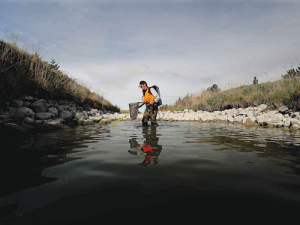Southland farmers want Fish & Game reprimanded
Southland farmers want the Government to strip Fish & Game of their advocacy function and refocus the organisation on the management of hunting and fishing.
 Central South Island Fish & Game and Mayfield Hinds Irrigation Limited staff salvage the scheme near the Rangitata River. Fish & Game officer Hamish Stevens is seen using an electric fishing backpack which temporarily stuns the fish and allows them to be netted. Photo: Richard Cosgrove/Fish & Game NZ
Central South Island Fish & Game and Mayfield Hinds Irrigation Limited staff salvage the scheme near the Rangitata River. Fish & Game officer Hamish Stevens is seen using an electric fishing backpack which temporarily stuns the fish and allows them to be netted. Photo: Richard Cosgrove/Fish & Game NZ
About 400 fish were released recently into the Rangitata River in a joint salvage operation by central South Island Fish & Game and Mayfield Hinds Irrigation Ltd (MHIL).
Each year as the irrigation season ends, staff from Fish & Game offer to work with irrigators to rescue fish from irrigation schemes being shut down for annual maintenance.
Among them is the Mayfield Hinds scheme, the largest privately owned scheme in New Zealand, which has delivered water from the Rangitata Diversion Race to 33,000ha since the late 1940s.
MHIL staff gradually lower the water in the races so that fish are not unnecessarily stressed and have time to head naturally to areas of deeper water in the races (called drops). Once the water in the drops is about thigh deep, it is electrically fished or drag-netted to recover as many fish as possible.
Fish & Game staff use a commercial electric fishing backpack which temporarily and humanely disorients the fish to enable them to be easily netted.
All fish recovered from the system are quickly returned to the Rangitata River. This year’s tally included a native longfin eel, three adult salmon, about 200 juvenile salmon and about 200 brown and rainbow trout.
Fish & Game says this was about a normal return for the Mayfield Hinds scheme, compared to previous years.
Two weeks earlier, staff in the North Canterbury region salvaged 1023 fish from the Amuri scheme, near Culverden.
Fish & Game says that with about 750 schemes in Canterbury, it works with many larger schemes, but says others may be unaware of its fish salvage capabilities.
Legal controls on the movement of fruits and vegetables are now in place in Auckland’s Mt Roskill suburb, says Biosecurity New Zealand Commissioner North Mike Inglis.
Arable growers worried that some weeds in their crops may have developed herbicide resistance can now get the suspected plants tested for free.
Fruit growers and exporters are worried following the discovery of a male Queensland fruit fly in Auckland this week.
Dairy prices have jumped in the overnight Global Dairy Trade (GDT) auction, breaking a five-month negative streak.
Alliance Group chief executive Willie Wiese is leaving the company after three years in the role.
A booklet produced in 2025 by the Rotoiti 15 trust, Department of Conservation and Scion – now part of the Bioeconomy Science Institute – aims to help people identify insect pests and diseases.

OPINION: The release of the Natural Environment Bill and Planning Bill to replace the Resource Management Act is a red-letter day…
OPINION: Federated Farmers has launched a new campaign, swapping ‘The Twelve Days of Christmas’ for ‘The Twelve Pests of Christmas’ to…